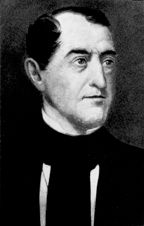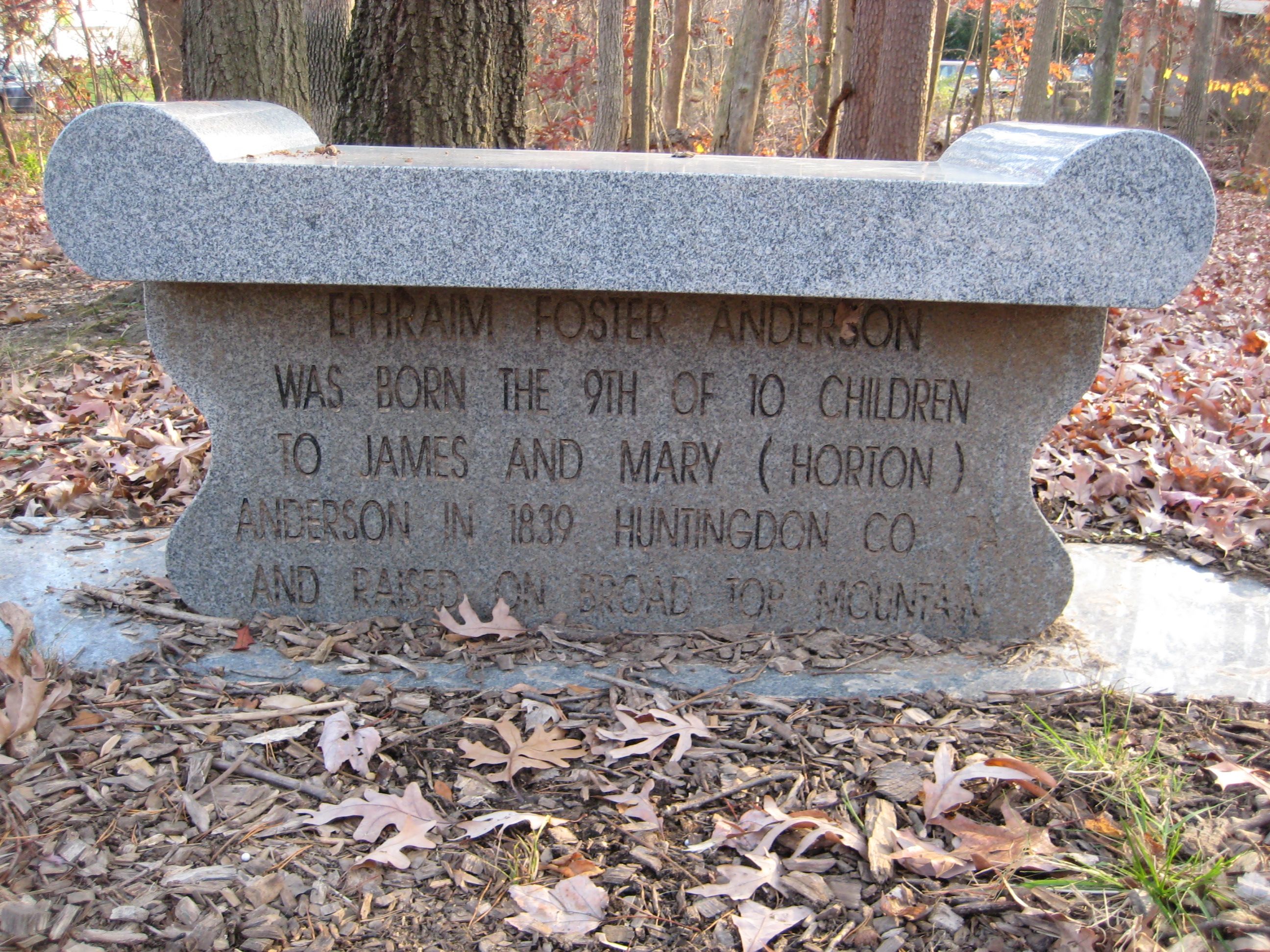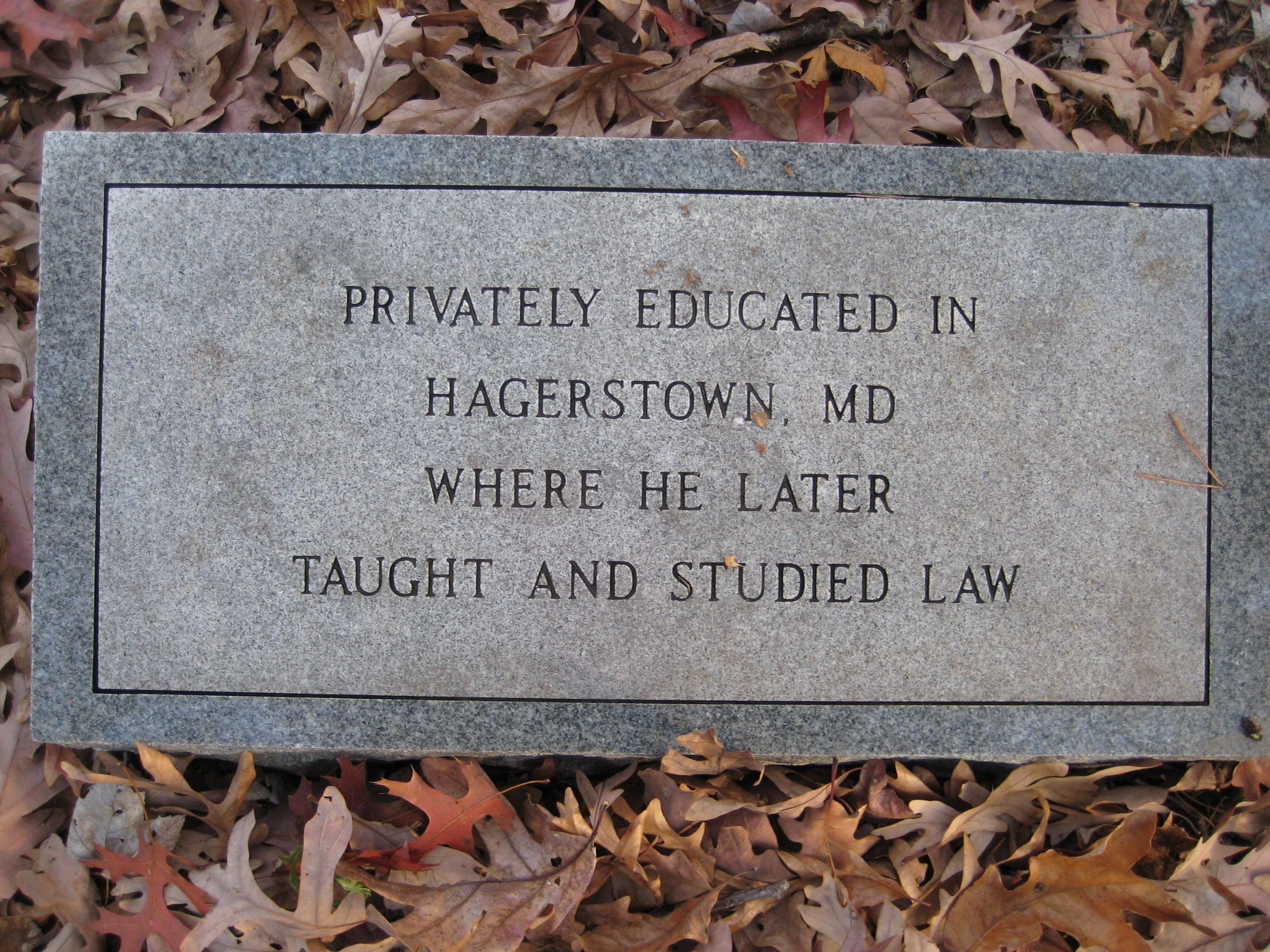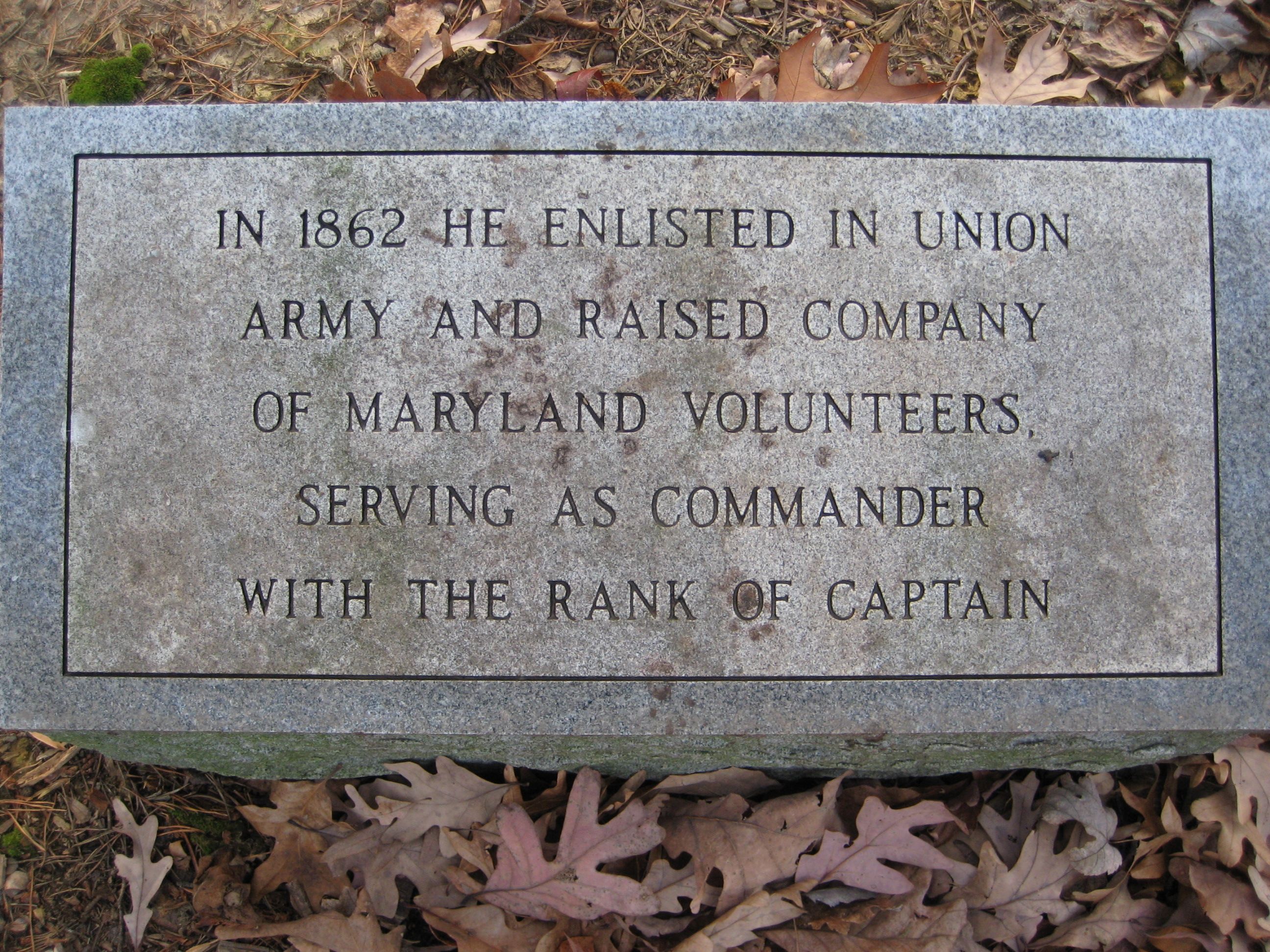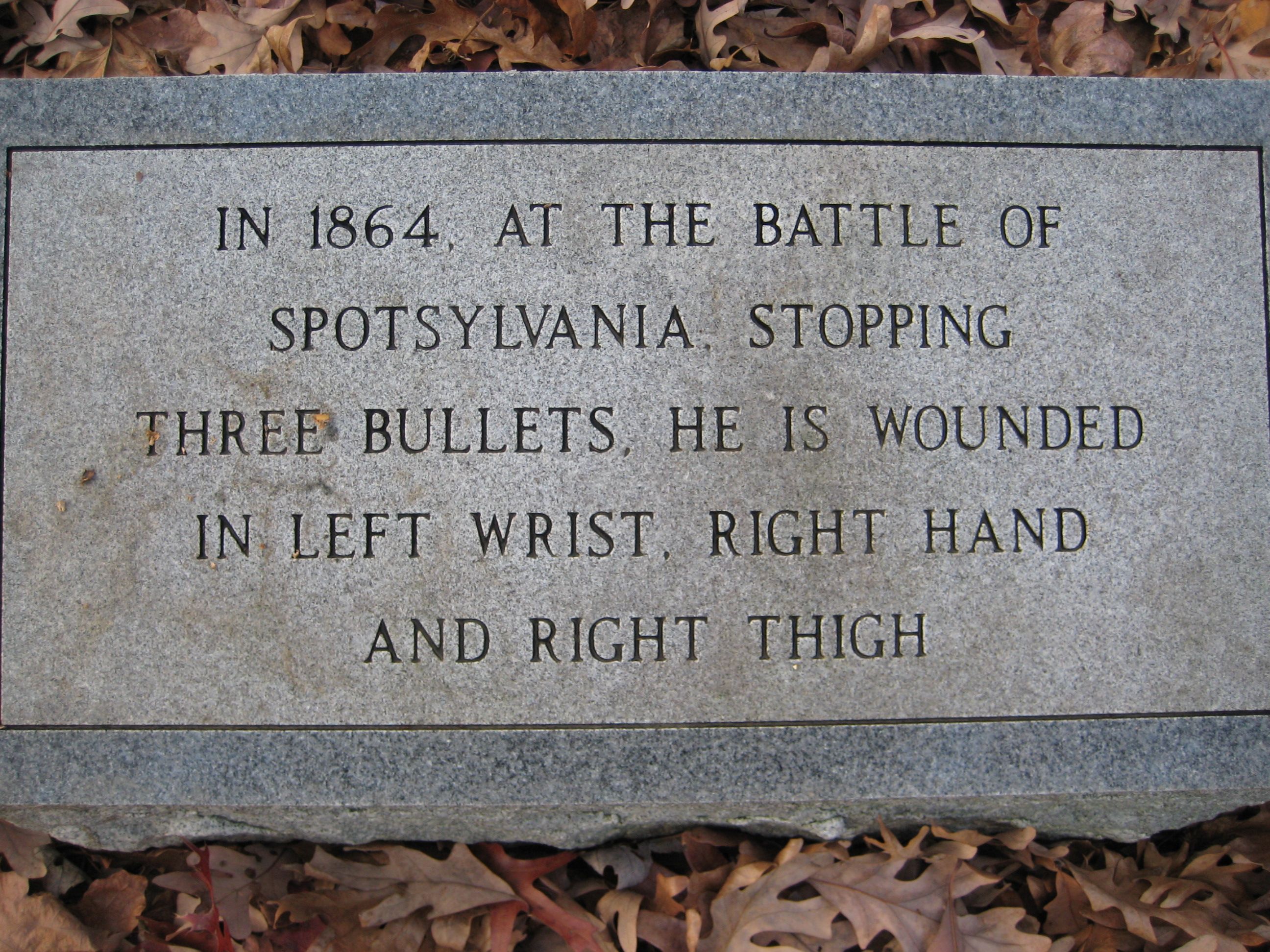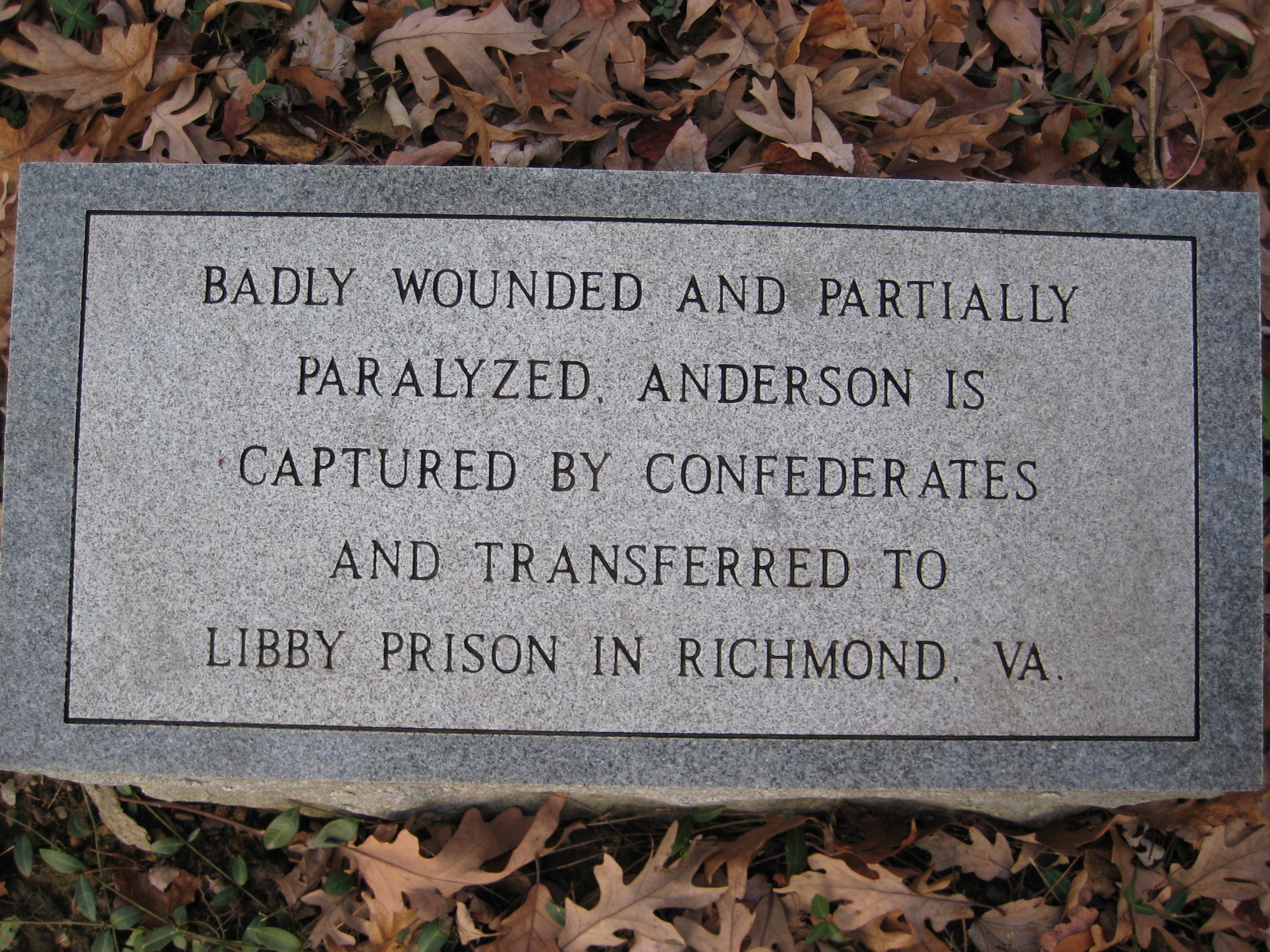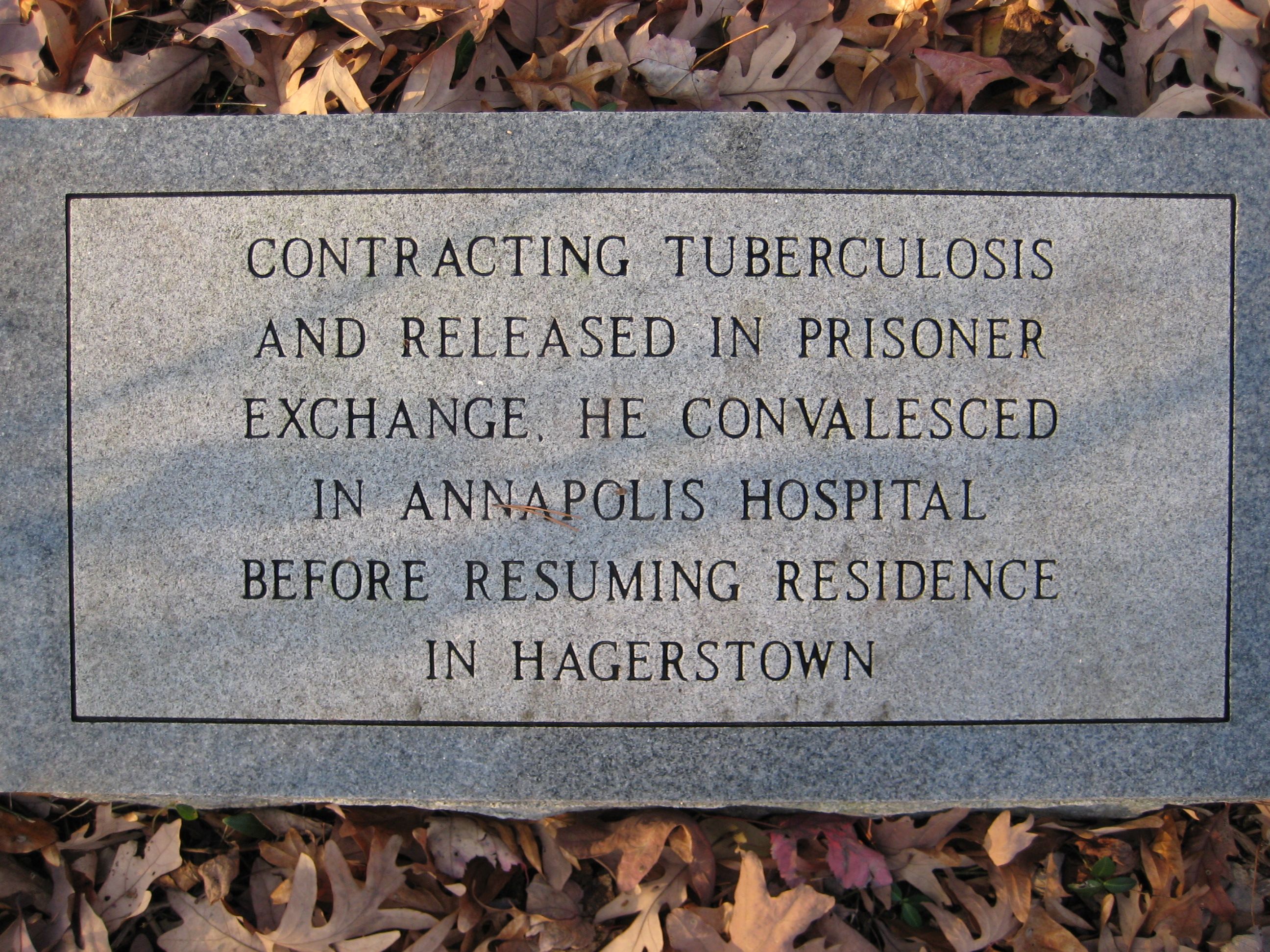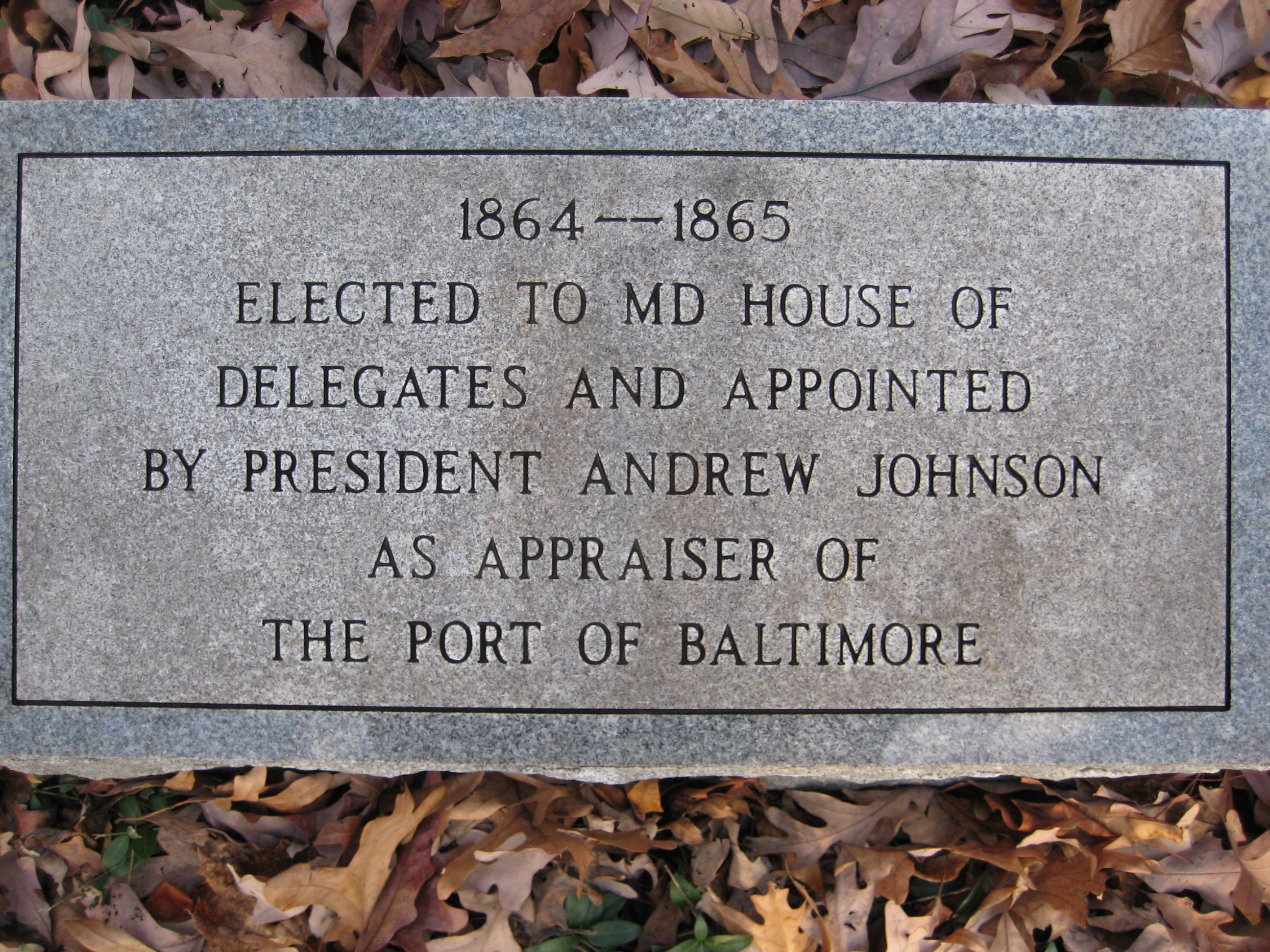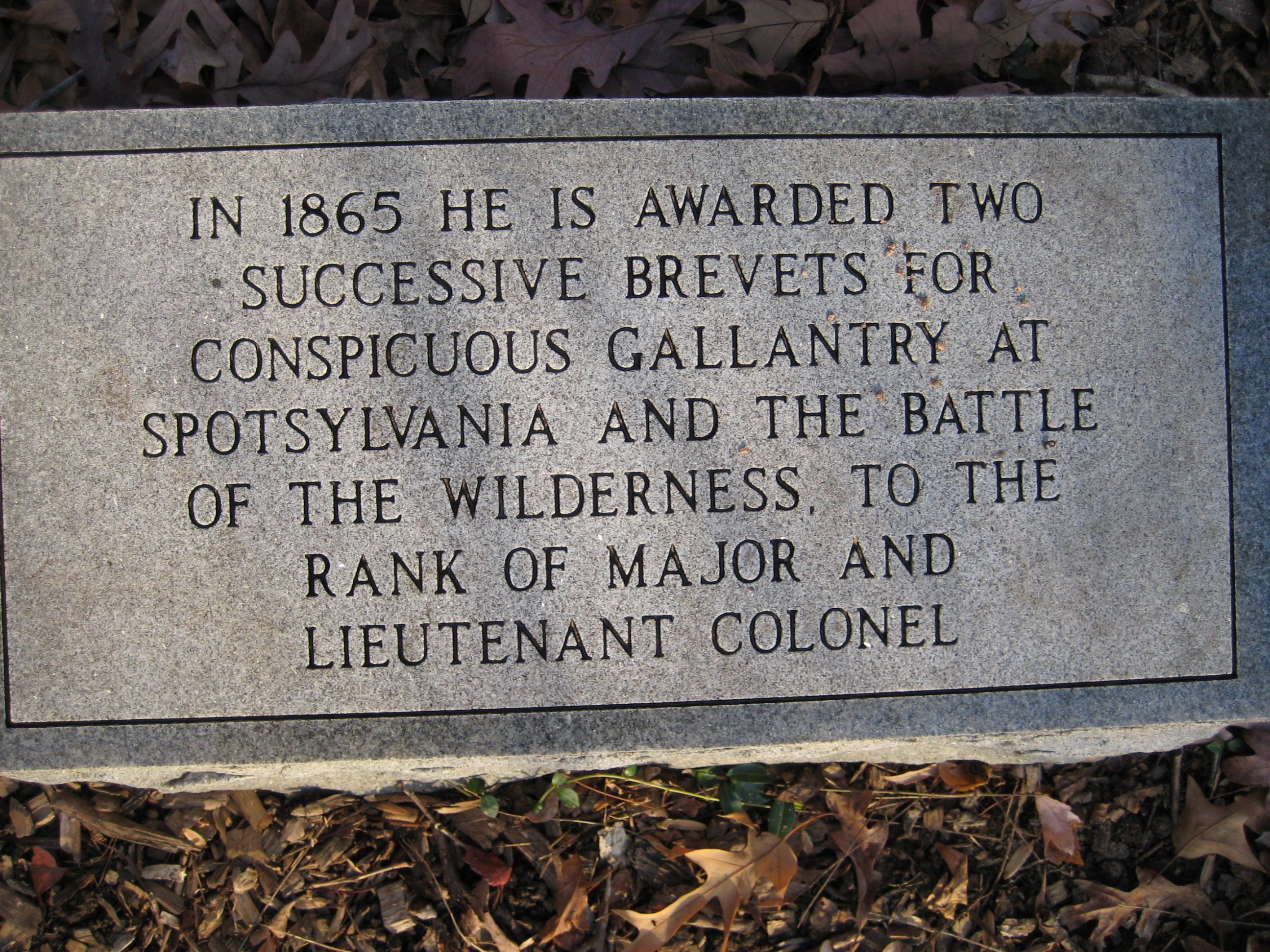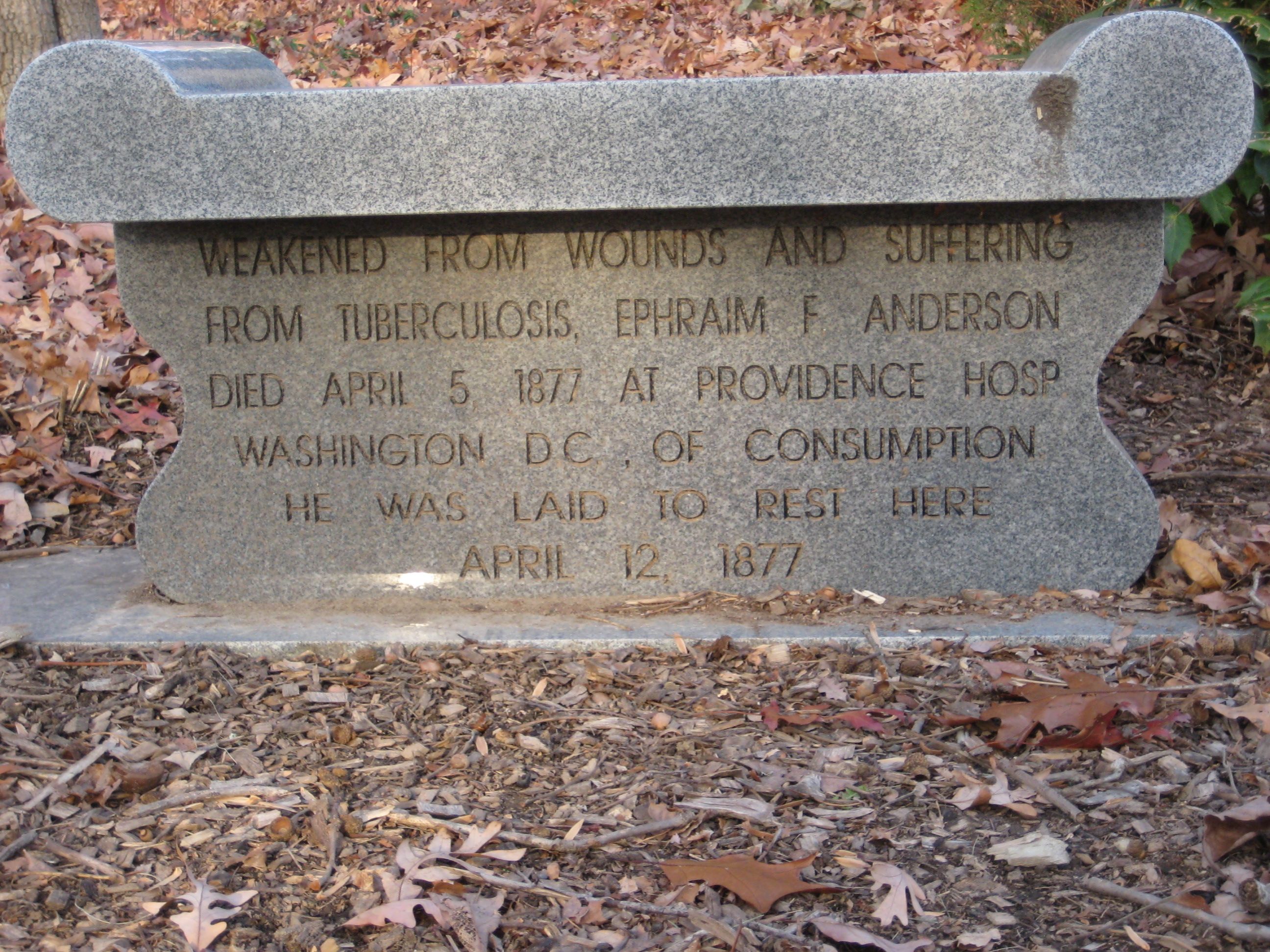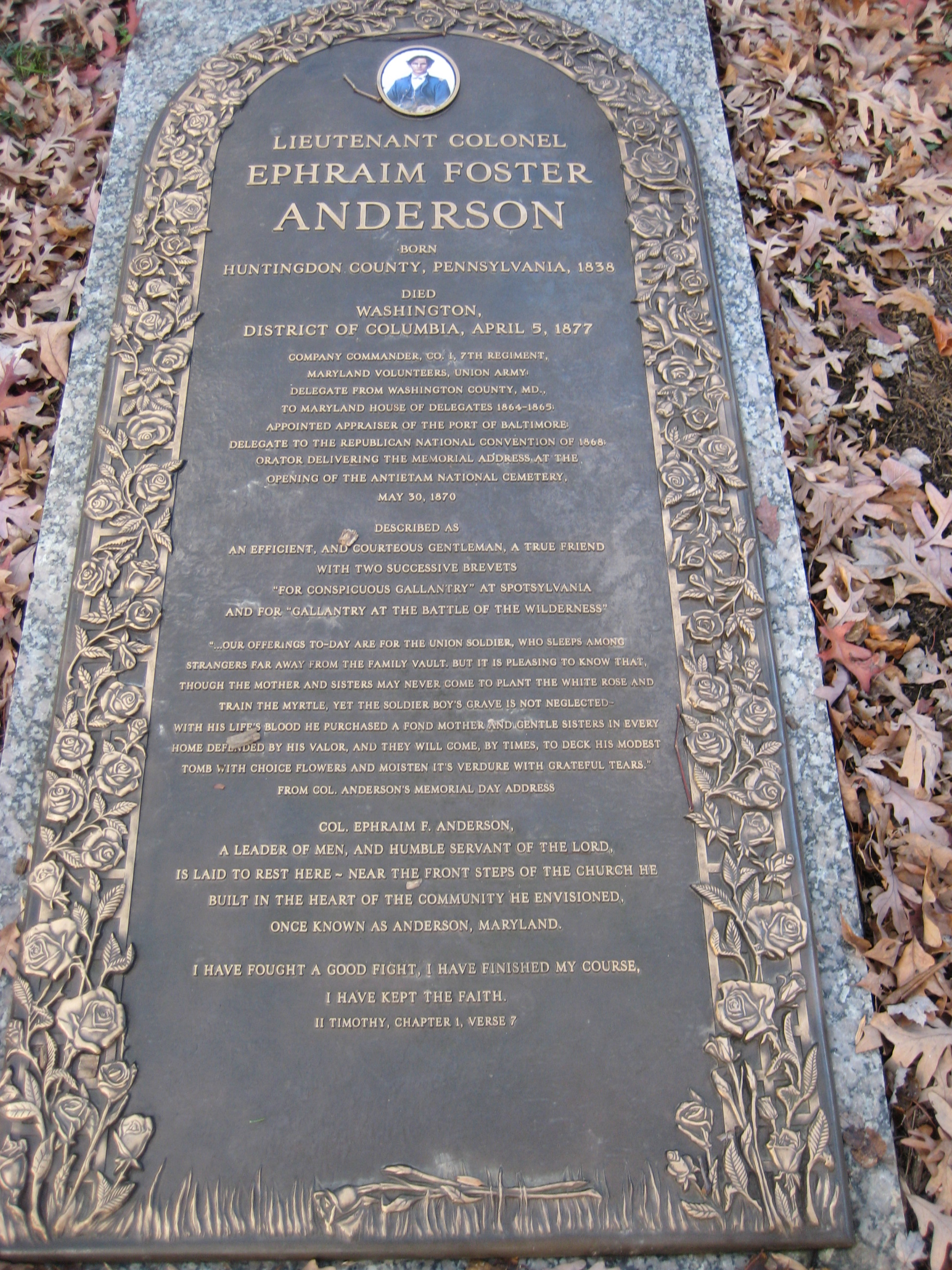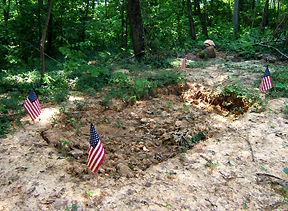There is some question whether Ephraim was born in Bedford or Huntingdon County. Per one Anderson descendant, the family homestead was located in both Huntingdon and Bedford Counties. The actual Anderson home was a short distance from the county boundary line in Huntingdon County.
As a teenager, Ephraim went to Hagerstown, Md., for his education. (Bio per David Cheslock of Chambersburg, a descendant.)
Ephram had a classical education and after he graduated, he taught school in the same area. He was known for giving stirring speeches.
During the time of war, Ephram Anderson served with the 7th Maryland {Infantry}, Cheslock said. He was a captain of Company I.
"There were several skirmishes, including the battle of Spotsylvania. He was in a charge at Laurel Hill.
"During the charge, his superior officer's horse was shot from under him. The horse fell on the officer, Col. Phelps. Ephraim Foster tried to extract him from under the horse. They were just a few paces by Confederate line."
During the attempted rescue, Anderson was wounded three times. He was taken to Libby Prison in Richmond, Va. From there he was paroled due to severe wounds. According to some records, he may have been exchanged for another prisoner and returned to Hagerstown.
When a newspaper reported he had been killed, Anderson wrote a letter to the paper and reported he was alive in prison, Cheslock said.
Anderson had been reprimanded by Col. Phelps before the attempted rescue.
Following his time in the military, Anderson served as a member of the House of Delegates in Maryland. He represented Washington County and was well known and well liked, according to Cheslock.
Anderson may have had ties to President Abe Lincoln. He also was a delegate to the Republican National Convention in Chicago, where Ulysses S. Grant was nominated for president.
Anderson became a lawyer and worked with Andrew Syster, a well-known attorney in Hagerstown. He died in 1877 at the age of 38.
Added info from Ephraim's military record:
Ephraim enlisted on 5 Sep 1862, he was discharged on 30 Nov 1864. On 13 Mar 1865 he was wounded at the Battle of Spotsylvania Court-house. He was given the rank of Brevet Lt Col for his conspicuous gallantry.
See newspaper story below:
Chambersburg man finds grave of ancestor, a Civil War veteran
By ROSCOE BARNES III Staff writer
http://www.publicopiniononline.com
After years of searching, a Chambersburg man has located the lost gravesite of his great-great-uncle, Lt. Col. Ephraim Anderson, who served in the Civil War.
He's been described as a forgotten soldier from the Union Army.
David Cheslock said he and his wife, Donna, learned last weekend that the burial site was in Hanover, Md., not far from the BWI Airport.
"My great-grandmother was his niece," Cheslock said on Friday. "He's from our direct line. We heard much about him growing up. My great-grandmother always told us that she had a famous uncle, a Civil War hero. He was in politics and had never been married."
They learned the location of the burial site on March 29. Permission to open the coffin was granted Wednesday by the Howard County's State's Attorney's office.
Cheslock and other family members watched in awe as they viewed various relics and images from the past. He had one comment: "I told you so."
Doing research
The search for knowledge about Anderson began several years ago, according to Cheslock. He had been doing genealogy research on his family line. As he began to gather information on Anderson, the data led him to Howard County.
Cheslock, who majored in history in college, felt the need to sort out the facts from fiction, he said.
His research journey took him and his wife, Donna, to Ellicott City, Md., where they used the local library. From there, they went to Hanover.
"He died in Washington, D.C.," he said. "We discovered that his body was held in a congressional cemetery in a public vault."
Anderson had recently returned from Florida where he had gone for his health, Cheslock said. He died in the hospital.
In Hanover
"What led us to Hanover was the congressional record that noted his body was moved to Hanover," Cheslock said. "We went there and discovered that a certain area was called 'Village of Anderson.' He was developing a village."
Cheslock and his wife tried to locate the area where Anderson had built a church. However, they could not find the church or the cemetery where he was buried.
"So my wife and I rang a doorbell on Anderson Avenue and a gentleman directed us to a neighbor, a lady who graciously told us that she attended Sunday School at that church when she was a little girl."
The lady said the colonel's church was no longer there. However, she pointed to where it had been.
"We went around and discovered a pile of rubble," he said. "We knew this was where his church was."
The woman said she remembered his tombstone and suggested he was buried under the church steps.
"We went back home and continued to work on the research," Anderson said.
Cheslock and his wife found help when they contacted Joetta Cramm, a local historian in Ellicott City. She became interested and before long, a man dropped by and asked her about Anderson. This man, Marvin Anderson, was a descendant.
Marvin Anderson is a historian and has published a book on his ancestor.
"Through the contacts we have, we brought in a couple of more relatives, including Bruce and Gretchen Anderson of Falls Church, Va. And Bill Anderson, also of Virginia: Bruce and Bill descended from another brother of Lt. Col. Anderson," Cheslock said.
The landowner signed an agreement so the families could dig. The church foundation was found by an amateur archeologist. Forensics specialists and professional grave diggers came in and started probing. They were persistent, Cheslock said.
Local historian
Cramm said the discovery of the remains was quite exciting. At the same time, it resulted in a moment of respect and acknowledgment.
"I had just come home," Cramm said. "I had been there all day. They said they found the vault and I went back and saw the vault. They kept digging and digging and digging. Monday and Tuesday, they got official permission to do it. They opened it on Wednesday.
There wasn't much inside the vault, according to Cramm. She saw a number of metal handles, a couple of buttons, imitation rosewood from the coffin. The cost of the funeral at that time, in 1877, was $161, she said.
Cramm said the finding is especially important for the Anderson family: "Some of them knew about him, but not much about him. They felt they had an obligation to take care of him or have him recognized."
Cramm said the family has decided to leave him there: "It's an undeveloped lot and it will not be developed because of the flood plain."
There is some question whether Ephraim was born in Bedford or Huntingdon County. Per one Anderson descendant, the family homestead was located in both Huntingdon and Bedford Counties. The actual Anderson home was a short distance from the county boundary line in Huntingdon County.
As a teenager, Ephraim went to Hagerstown, Md., for his education. (Bio per David Cheslock of Chambersburg, a descendant.)
Ephram had a classical education and after he graduated, he taught school in the same area. He was known for giving stirring speeches.
During the time of war, Ephram Anderson served with the 7th Maryland {Infantry}, Cheslock said. He was a captain of Company I.
"There were several skirmishes, including the battle of Spotsylvania. He was in a charge at Laurel Hill.
"During the charge, his superior officer's horse was shot from under him. The horse fell on the officer, Col. Phelps. Ephraim Foster tried to extract him from under the horse. They were just a few paces by Confederate line."
During the attempted rescue, Anderson was wounded three times. He was taken to Libby Prison in Richmond, Va. From there he was paroled due to severe wounds. According to some records, he may have been exchanged for another prisoner and returned to Hagerstown.
When a newspaper reported he had been killed, Anderson wrote a letter to the paper and reported he was alive in prison, Cheslock said.
Anderson had been reprimanded by Col. Phelps before the attempted rescue.
Following his time in the military, Anderson served as a member of the House of Delegates in Maryland. He represented Washington County and was well known and well liked, according to Cheslock.
Anderson may have had ties to President Abe Lincoln. He also was a delegate to the Republican National Convention in Chicago, where Ulysses S. Grant was nominated for president.
Anderson became a lawyer and worked with Andrew Syster, a well-known attorney in Hagerstown. He died in 1877 at the age of 38.
Added info from Ephraim's military record:
Ephraim enlisted on 5 Sep 1862, he was discharged on 30 Nov 1864. On 13 Mar 1865 he was wounded at the Battle of Spotsylvania Court-house. He was given the rank of Brevet Lt Col for his conspicuous gallantry.
See newspaper story below:
Chambersburg man finds grave of ancestor, a Civil War veteran
By ROSCOE BARNES III Staff writer
http://www.publicopiniononline.com
After years of searching, a Chambersburg man has located the lost gravesite of his great-great-uncle, Lt. Col. Ephraim Anderson, who served in the Civil War.
He's been described as a forgotten soldier from the Union Army.
David Cheslock said he and his wife, Donna, learned last weekend that the burial site was in Hanover, Md., not far from the BWI Airport.
"My great-grandmother was his niece," Cheslock said on Friday. "He's from our direct line. We heard much about him growing up. My great-grandmother always told us that she had a famous uncle, a Civil War hero. He was in politics and had never been married."
They learned the location of the burial site on March 29. Permission to open the coffin was granted Wednesday by the Howard County's State's Attorney's office.
Cheslock and other family members watched in awe as they viewed various relics and images from the past. He had one comment: "I told you so."
Doing research
The search for knowledge about Anderson began several years ago, according to Cheslock. He had been doing genealogy research on his family line. As he began to gather information on Anderson, the data led him to Howard County.
Cheslock, who majored in history in college, felt the need to sort out the facts from fiction, he said.
His research journey took him and his wife, Donna, to Ellicott City, Md., where they used the local library. From there, they went to Hanover.
"He died in Washington, D.C.," he said. "We discovered that his body was held in a congressional cemetery in a public vault."
Anderson had recently returned from Florida where he had gone for his health, Cheslock said. He died in the hospital.
In Hanover
"What led us to Hanover was the congressional record that noted his body was moved to Hanover," Cheslock said. "We went there and discovered that a certain area was called 'Village of Anderson.' He was developing a village."
Cheslock and his wife tried to locate the area where Anderson had built a church. However, they could not find the church or the cemetery where he was buried.
"So my wife and I rang a doorbell on Anderson Avenue and a gentleman directed us to a neighbor, a lady who graciously told us that she attended Sunday School at that church when she was a little girl."
The lady said the colonel's church was no longer there. However, she pointed to where it had been.
"We went around and discovered a pile of rubble," he said. "We knew this was where his church was."
The woman said she remembered his tombstone and suggested he was buried under the church steps.
"We went back home and continued to work on the research," Anderson said.
Cheslock and his wife found help when they contacted Joetta Cramm, a local historian in Ellicott City. She became interested and before long, a man dropped by and asked her about Anderson. This man, Marvin Anderson, was a descendant.
Marvin Anderson is a historian and has published a book on his ancestor.
"Through the contacts we have, we brought in a couple of more relatives, including Bruce and Gretchen Anderson of Falls Church, Va. And Bill Anderson, also of Virginia: Bruce and Bill descended from another brother of Lt. Col. Anderson," Cheslock said.
The landowner signed an agreement so the families could dig. The church foundation was found by an amateur archeologist. Forensics specialists and professional grave diggers came in and started probing. They were persistent, Cheslock said.
Local historian
Cramm said the discovery of the remains was quite exciting. At the same time, it resulted in a moment of respect and acknowledgment.
"I had just come home," Cramm said. "I had been there all day. They said they found the vault and I went back and saw the vault. They kept digging and digging and digging. Monday and Tuesday, they got official permission to do it. They opened it on Wednesday.
There wasn't much inside the vault, according to Cramm. She saw a number of metal handles, a couple of buttons, imitation rosewood from the coffin. The cost of the funeral at that time, in 1877, was $161, she said.
Cramm said the finding is especially important for the Anderson family: "Some of them knew about him, but not much about him. They felt they had an obligation to take care of him or have him recognized."
Cramm said the family has decided to leave him there: "It's an undeveloped lot and it will not be developed because of the flood plain."













